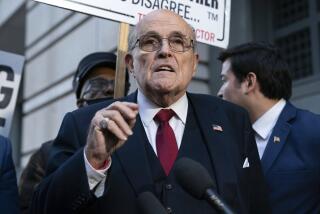Bankruptcy protection offers hope for Detroit, setback for its unions
After a federal judge ruled Tuesday that Detroit was eligible for bankruptcy protection and cleared the way for municipal pensions to be cut, city officials were upbeat, called for unity and urged residents to look ahead with optimism.
But for the city’s employee unions, whose members, current and retired, are likely to face benefit reductions, the decision signaled the start of a new legal round — their appeal of the ruling to a higher court.
The disparate reactions were symptomatic of what lies ahead for Detroit. The political differences between the city and its unions have not dissipated, nor has the economic reality of trying to reduce about $18 billion in debt by deciding how to apportion the pain of cuts.
In his decision Tuesday, U.S. Bankruptcy Judge Steven Rhodes found that Detroit, once the nation’s fourth-largest city, was insolvent and was allowed to enter Chapter 9 bankruptcy protection, making it the largest municipal bankruptcy in U.S. history. He also ruled that the pension checks of retirees could be reduced as part of the bankruptcy proceedings.
“This once proud and prosperous city cannot pay its debts. It is insolvent. It’s eligible for bankruptcy,” Rhodes said. “But it also has an opportunity for a fresh start.”
Under Kevyn Orr, the state-appointed emergency manager, the city will introduce its proposal to restructure its debt and reshape government services and operations within weeks, with details early next year. Known as a plan of adjustment, it could include selling assets and reducing pensions. The goal is for Detroit to exit bankruptcy protection by the end of September.
“I would ask creditors and our labor partners to come forward and work with us to get at the sorely needed reform this city has got to achieve,” Orr said during a televised news conference. “Hopefully we can present a consensual plan of adjustment.
“This eligibility ruling is a start for us. It is an overture, an opportunity to work together,” he said. “Let’s come together, work together and get this done.”
“We’re disappointed by the ruling,” said Sharon Levine, an attorney for the American Federation of State, County and Municipal Employees, which represents half the city’s workers. The unions maintain that the state constitution protects pensions from being cut, an issue that could end up being decided by the U.S. Supreme Court.
In his ruling, Rhodes said Michigan’s protections “do not apply to the federal bankruptcy court,” adding that pensions are not entitled to “any extraordinary attention” compared with other debts. He said the court would not “lightly or casually exercise the power to impair pensions,” but he was clear that the court would allow cuts. Michigan Atty. Gen. Bill Schuette said he disagreed with that part of the decision.
The conflicts involving the unions, other creditors and the city remain sharp.
“We’ve tried hard to negotiate,” Levine said, adding that Orr had not been willing to bargain in good faith. Levine said she had already sought permission to take the case directly to the U.S. 6th Circuit Court of Appeals in Cincinnati because time is of the essence and there is no stay of the bankruptcy ruling while the appeal is underway.
“Our members and retirees remain concerned about their pensions and jobs,” she said.
The Detroit firefighters union also said it would fight to save the pensions of its retired members as well as jobs that could be lost in the reorganization.
Orr said the city was “trying to be very thoughtful, measured and humane.” However, “the reality is that there is not enough money to address the situation no matter what we do.”
In a report to creditors in June, the city outlined its dire straits: Its population has declined 63% from its postwar peak, its general fund has run a deficit for the last five years, 40% of its streetlights don’t work, and the understaffed Police Department has some of the slowest response times in the nation.
Detroit has not been contributing to its pension funds, and by the end of the year it will have deferred $100 million in contributions. Orr has not said specifically how he would alter pension payments, but he has said some adjustment would need to be made to deal with $3.5 billion in unfunded liabilities. Unions say that could mean cutting pensions in half. The market value of the assets in the pension funds on June 30, 2012, was $4.3 billion.
To be eligible to reduce its debts in bankruptcy proceedings, Detroit had to show that it was insolvent and that it had negotiated in good faith with creditors before the filing.
In his ruling Tuesday, Rhodes said the city had proved it is insolvent, pointing to testimony by Detroit’s new police chief, James Craig, who detailed the inadequate conditions in police precincts. But Rhodes chastised the city for the June plan it proposed for creditors, calling it vague, and said the city had not negotiated in good faith.
But he ruled that city officials had filed their bankruptcy petition in good faith, meaning the city was eligible for bankruptcy protection.
Mayor Dave Bing, who did not seek reelection and whose term expires at the end of the year, said the ruling would be beneficial in the long run.
“There’s going to be a lot of pain for a lot of different people,” he told reporters. “But in the long run, the future will be bright. Now the hard work starts.”
More to Read
Sign up for Essential California
The most important California stories and recommendations in your inbox every morning.
You may occasionally receive promotional content from the Los Angeles Times.












